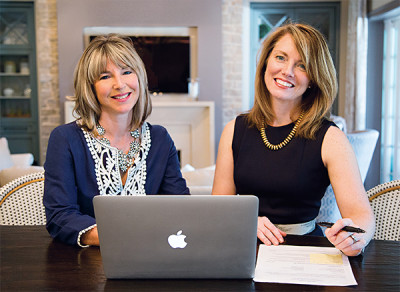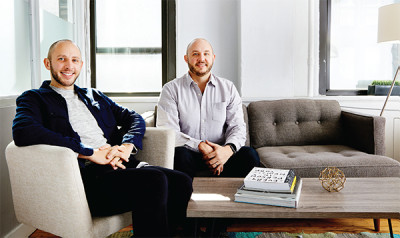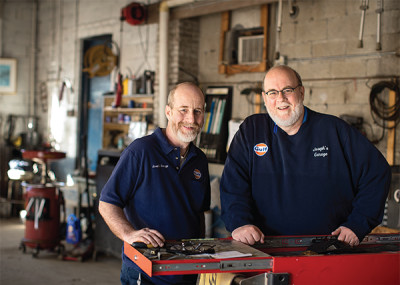
Art (left) and John Joseph, both ’84, of Joseph’s Garage in Norwell, Massachusetts
The Joseph brothers don’t bother having business meetings. Many times, they can come to a decision without even saying a word to each other.
Art and John, both ’84, are the third-generation owners of Joseph’s Garage, a Norwell, Massachusetts, institution started in 1928 by their grandfather and then run by their father and uncle. The brothers have worked at the garage for nearly their entire lives. John began when he was 15, around the time he took apart and rebuilt a 1967 Pontiac Firebird, his first car. Art started at the age of 9. One Saturday morning, he was about to settle in to watch TV when he noticed two lunch bags sitting on the table, instead of the usual one for his father. “The next thing I knew I was here,” he says.
With their long, shared histories, the brothers are typically in sync on business concerns and can anticipate what the other might say. “We have the same background, the same set of friends, the same teachers,” says Art, who is two years older than his brother. “It’s almost like we’re the same person. We’re exactly of one mind.” Even if a decision proves difficult, they rarely have disagreements. They silently weigh the pros and cons and know what needs to be done. “We’ve already had the argument in our mind,” says John. “We just give each other a look.”
Such is the ease and familiarity that can happen when working with a brother or sister. Yes, personalities and skills may not always mesh, and mixing family in matters of business may be tricky. But to go into business with a sibling is to partner with someone whose connection to you runs deep. When it jibes, there is trust. And respect. And love. “I like working with my brother,” Art says. “We’ve spent so much time together. There is nothing worth fighting over.”

Photo: Peter Taylor
Sue Cooke ’87 (left) and Joanne Verkuilen ’92 of Circle + Bloom in Charlotte, North Carolina
The Sisters in Charlotte
When Sue Cooke ’87 considered joining the startup of her sister, Joanne Verkuilen ’92, the two had serious conversations about how that partnership would play out. “There was a bit of concern at first,” says Joanne. “You hear these adages about how you don’t go into business with family or friends.”
The sisters didn’t want to harm their relationship, which has grown warm and close in their adult years. As children, they were more distant. Five years apart in age, they have the same father, but different mothers, and so were raised in separate households. The two would see each other, but they didn’t have much of a connection. Then as adults in their 20s, Sue decided to invite Joanne, who had just graduated from Babson, to tag along on a business trip she was taking to Europe. The two traveled to London and Paris and other parts of France, along the way realizing they had much in common. “It was great,” Sue says. “That was the first true one-on-one bonding we had.”
Nowadays, the sisters’ lives are intertwined. They both live in the Charlotte, North Carolina, area, a mere 10 minutes from each other. They vacation and celebrate birthdays together, and they have children the same age. They also are linked by Circle + Bloom, their women’s health venture, the roots of which began with Joanne’s attempts to become pregnant with her second child. As someone with polycystic ovarian syndrome, a hormonal imbalance that can make conception difficult, Joanne went through two miscarriages and about two years of trying before finally giving birth. That struggle took a toll, as it does for many women. “It is one of the most stressful, difficult times in a woman’s life,” Joanne says. “It shakes your whole foundation of what you wanted for your life.”
Joanne has long been interested in the connection between the mind and body, but she was too drained and distracted to investigate how that link might help her when she was trying to become pregnant. Later when a close friend also had difficulty conceiving, however, Joanne made her a simple meditation program to help alleviate stress and visualize what was going on in her body. The grateful friend found the program re-energizing and relaxing and eventually gave birth. Soon after, Joanne was standing in her kitchen one morning, drinking coffee while staring out at her backyard, when she had an epiphany. What if she created a more substantial program for other women struggling to get pregnant, she thought, one that corresponded to each day of a woman’s menstrual cycle?
Having spent a career in finance, Joanne was looking for a change and wondered about the business potential of her idea. As she conducted research, she talked frequently with Sue. “She would run things by me,” Sue says. “I thought it was a great business idea.” But months passed, and while Joanne was working on Circle + Bloom, she still hadn’t committed fully to launching it as a business. Sue finally told her: “I think you’re at the point where you’re either going to do something or not.”
Sue set up a meeting for Joanne and herself with an investor she knew, Jerry Greenberg. He liked the business and wanted to invest, except for one catch. He turned to Sue. “If I’m going to put money into it, I want you involved,” Greenberg said. “I don’t know her.” The sisters saw the sense in the request. Sue had the time to devote to Circle + Bloom, and, in a career spent as an executive and consultant, she had gained a lot of experience growing companies.
But mixing business and family was a concern, so the sisters had honest talks about how their strengths and weaknesses would match up, how responsibilities would be divided, and how they would deal with disagreements and difficult times. “You really need to have the tough conversations up front,” Sue says. “You need to think about the potential conflicts before they come your way.”
In the end, they decided to go for it. “We felt confident that this wasn’t something that would hurt our relationship as sisters,” Sue says. “And it hasn’t. It’s been great.” Circle + Bloom launched in 2008. Joanne handles product development, which involves consulting with doctors and recording the meditations that she writes, while Sue looks over the financials. In case of strong disagreements, the sisters decided early on that their investor, Greenberg, would serve as the tiebreaker, though such a thorny situation has never come up.
In the beginning, Circle + Bloom faced slow growth, but word of mouth has fueled a recent surge in business. Beyond fertility, the company also has added programs that address restless sleep, cancer treatment, and other issues. “We’re hitting some of our best months,” Joanne says. “It’s taken some time, but it’s really growing now.”
The sisters hear from many women who believe the company’s offerings have helped them. “I get emails every day, people thanking us,” Joanne says. “We get incredible success stories. It’s really rewarding.” Adds Sue, “It’s very inspirational. I have lots of respect for Joanne. She’s the one who came up with this. Her creativity is just amazing.”
For her part, Joanne is happy to have a partner along for the ride. “Having to be on your own can be really tough,” she says. “You have no one to share the hurdles with, to talk with, to strategize with.” The fact that her partner is her sister is a bonus. “She is a friend,” she says. “I respect her so highly. There is a huge amount of trust. The entrepreneurial path is arduous and filled with excitement, but to share that with a family member, it is very rewarding.”

Photo: Eric Medsker
David ’05 (left) and Andrew Heath, MBA’12, of Bombas in New York City
The Bombas Brothers
Growing up, Andrew and David Heath, the brothers behind the successful New York City-based Bombas sock company, spent a lot of time outside. They climbed trees, rode bikes, and played in a stream that ran through their backyard. They got on each other’s nerves a bit, admits Andrew, but that eased up over time. By high school and college, the brothers talked about going into business together. They realized they had different but complementary skillsets. “I’m very logic based. I’m a finance guy,” says big brother Andrew, MBA’12, who is three years older than his sibling. “David is extremely outgoing. He’s a salesperson through and through. He’s got the ability to talk to anyone about anything.”
The brothers were raised in a house that prepared them well for entrepreneurship. As kids, they watched their father grow his company, which provides wood-chip surfacing for playgrounds, from a startup in the family garage to a large, successful firm with customers across the country. “We watched my dad’s business grow from nothing to something,” says David ’05. Seeing the entrepreneurial spirit up close left an impression on the brothers. “We saw our father’s life as something fun and wanted to emulate it,” says Andrew.
The brothers also credit their father and mother, who was a banker and financial planner, for instilling in each of them the same solid values for doing business. “They have a do-the-right-thing mentality,” says Andrew. “You don’t need to grow the business at the expense of someone else.” The brothers treat colleagues, and especially each other, with respect. “At the end of the day, my brother is my brother,” says David. “I don’t want to screw over my brother. My brother isn’t going anywhere.”
The brothers’ first venture together was a New York City-based truffle company, which they launched with their father and another partner in 2012. The brothers worked well together, and the company was profitable. But then the partner announced that he wanted to buy out their half of the business and take over sole ownership. The brothers decided to relent, and they and the elder Heath sold their share in early 2015. By then, though, the brothers had another venture percolating: Bombas.
David found the inspiration for Bombas, which donates one pair of socks to someone in need for every pair it sells, when he read a quote from the Salvation Army saying that the most needed clothing item at homeless shelters is socks. Wanting to build a business that creates social good, David researched Bombas in 2011 and 2012. Andrew thought the venture was promising and soon wanted to be a part of it. “If you’re interested in pursuing it, then bring me along,” Andrew told David, who knew he would need someone reliable to handle the company’s financials. Andrew eventually joined Bombas in 2013, the same year it launched its first product. To date, the company has donated more than 900,000 pairs of socks, and it works with charities across all 50 states. Last year Bombas earned $4.6 million in revenue. “We’re doing phenomenally,” Andrew says.
David serves as Bombas’ CEO, and although he strives to run the company democratically, times arise when he must overrule others, even his brother. But Andrew understands. “Someone needs to have the final say ultimately,” says Andrew, the company’s COO and CFO. “When a hard decision needs to be made, he’ll stick his neck out and make the call.”
In the company dynamic, analytical Andrew often plays the role of devil’s advocate, serving as an important gut check to his brother’s positivity. “It’s a good mix,” Andrew says. “David is an eternal optimist. You have to be as CEO. When you are an eternal optimist, you constantly assume things will work out. I’m a little more grounded. I’m not negative, but I’m grounded. I do have doubts.”
To be brothers and business partners means spending much time together. In the office, Andrew’s and David’s desks are within arm’s reach of each other. Outside the office, they take ski and snowboard trips together, and they even live in the same building, their apartments located one above the other. When they hang out, the business is a frequent topic of conversation. “It gets annoying to others,” David says.
Despite living such interconnected lives, the two don’t feel as if they need a break from all the brotherly togetherness. “We are not sick of each other at all,” Andrew says. “It’s a lot of fun.”

Photo: Tom Kates
John (left) and Art Joseph at their family’s garage, which their grandfather started in 1928
The Brothers in the Garage
For a brief time, Art and John Joseph flirted with the idea of not going into the family business. As a senior at Babson, Art bought a nice suit and went to a bunch of interviews. John took a part-time market research gig for a while. But neither took his pursuit seriously. To work with cars side by side with their family was what they wanted to do. “I think we ultimately knew where we would end up, and it would be OK,” Art says.
Joseph’s is as much a business as it is a living piece of their family history. In the cluttered service area sits their dad’s toolbox, Uncle Phil’s toolbox, and a host of cans, boxes, and parts that look as if they were put down years ago and haven’t moved since. “Everything is exactly where we put it, whether that’s this week or 40 years ago,” John says. Art’s office used to be his grandfather’s, and not much has changed. “I’m sitting here looking at the same paneling,” Art says. “It’s harder to change things in a family business because you know the guy who put it there.”
John manages the service area. Just as his Uncle Phil did before him, he oversees the gas pumps and the brake jobs, oil changes, and repair work. “I like working on cars,” he says. “It’s all problem solving.” Art, meanwhile, serves as office manager. Just as his father did, he keeps the books and also sells cars. For decades, Joseph’s was a Pontiac dealership, but then the marque was discontinued in 2010, so the garage now sells used vehicles. Joseph’s loyal customers helped the garage weather the loss of the iconic brand. “We still have some of the same customers who were coming in here when I started,” Art says.
Joseph’s is open six days a week, though it closes a bit early on Saturdays, a tradition started in the 1960s so workers could attend 5 p.m. church services in nearby Scituate. The brothers rarely take a day off. “How do I take a day off?” asks John. “You have to burden someone else.” John believes this is actually the biggest challenge of working in a family business. If you take off at IBM, Microsoft, or some other large corporation, the business simply goes on without you. But if he takes a day off at the garage, he knows his brother and the other workers in the small shop will have to cover for him. “The work doesn’t disappear,” he says.
While Art and John run the garage’s day-to-day operations, they also have three younger brothers, Henry, Herb, and Edward, who cycle through from time to time, helping with towing, pumping gas, and miscellaneous projects. All five brothers began working at Joseph’s as kids, and, as is the custom, pumped gas before moving on to other jobs. Art, who learned to drive by the age of 9 or 10, would help drop off cars with his dad. While his father drove a customer’s car, Art followed behind, driving his dad’s Pontiac. This one day caught the attention of the local police. “The first time I was pulled over I was 12 or 13,” Art admits. The officers told him: “We know you’re a good driver. Just stop waving at us.”
Two nephews currently work at the garage, both of whom also started out by pumping gas. In all, the five brothers have 10 children, but they’re all under the age of 22, so Art is unsure who may ultimately enter the family business. “We’re still in the early innings,” he says.
Until a new generation is ready to take over, Art and John feel a responsibility to keep Joseph’s alive and well. “It’s a stewardship,” Art says. John doesn’t see that responsibility diminishing. “There’s no retirement. There’s no ending,” he says.Sitting in the old office of his grandfather, whose picture hangs on the wall, Art feels firsthand this responsibility as he works on the garage’s payroll. He lingers on the names listed, his and John’s and their other brothers and nephews. To see them all there together gives him great pride. “You look down the payroll,” he says, “it’s cool.”
